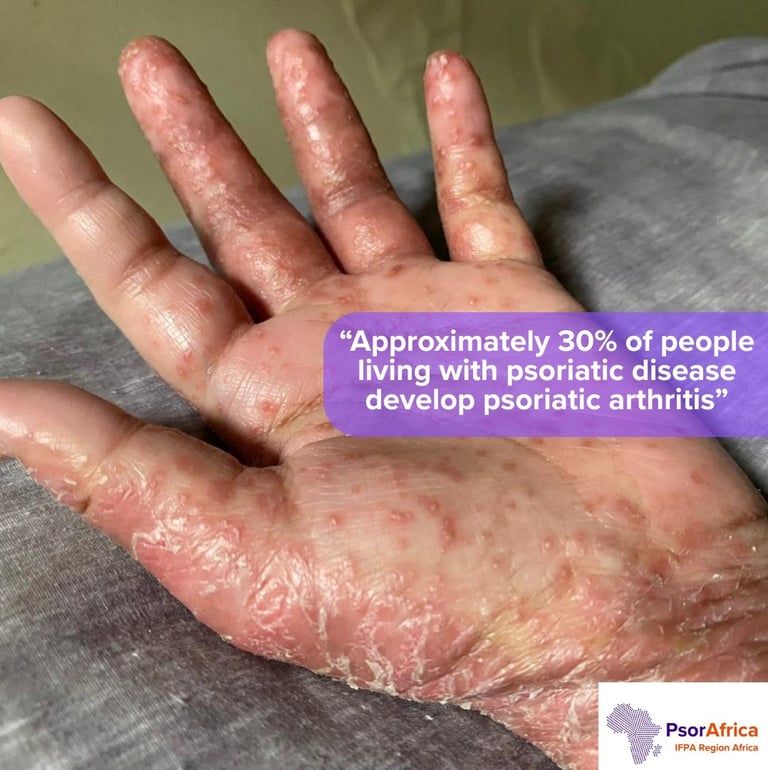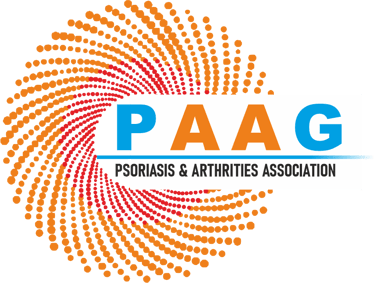Psoriasis is a long-term, inflammatory, and non-contagious disease.
Basic information about psoriasis
Psoriasis is a chronic inflammatory disease that causes skin and joint symptoms and predisposes to other diseases. Susceptibility to psoriasis is inherited.
In the Gambia, psoriasis affects about one percent of the population, or about 100,000 people. Of these, 2–8 percent have severe psoriasis. Psoriasis is not contagious.
According to a statement from the World Health Organization (WHO), psoriasis is a chronic, non-contagious, painful and disabling disease for which there is no cure.
Hereditary and external causes
Psoriasis Causes and Risk Factors
Psoriasis is caused by a genetic predisposition, which is transmitted through several genes. Because the disease is multifactorial, it can be passed down through several generations. Symptoms do not occur in everyone with a genetic predisposition.
According to the Current Treatment Recommendations for Psoriasis, the risk of developing the disease is 14–28 percent if one parent has psoriasis. If both parents have psoriasis, the risk is 41–65 percent.
In addition to genetic predisposition, many external factors contribute to the onset of psoriasis. These include infectious diseases and other inflammations, poor oral hygiene, skin damage, heavy alcohol consumption, smoking, obesity and stress. These factors can also worsen psoriasis symptoms.
Regular exercise is the only factor that has been shown by research to reduce the incidence of psoriasis. It is also worth avoiding factors that trigger the disease.
Psoriasis can occur at any age, including childhood. It is most common between the ages of 15–25 and 50–65. Adolescent and adult psoriasis have partly different genetic backgrounds.
Psoriasis symptoms and diagnosis
The symptoms of psoriasis are individual and varied. Not everyone may experience the same type of symptoms.
People with psoriasis may have skin symptoms, joint symptoms, or both. Psoriasis is often associated with nail symptoms. The inflammation associated with psoriasis can cause long-term fatigue.
Psoriasis can affect any part of the skin. The most common areas are the elbows, knees, and scalp. Skin symptoms often include well-defined, red, thickened patches that may be scaly and itchy.
Psoriatic rashes may appear in areas where the skin has been damaged or rubbed. This is called the Köbner phenomenon.
Symptoms range from a few patches to a rash covering the entire body. The severity and symptoms of psoriasis can vary even in the same person at different times. Sometimes there can be long periods when the symptoms are milder or disappear completely. The disease has seasonal variations: symptoms are often worse in winter and milder in summer.
Symptoms of psoriasis of the joints include pain, stiffness, swelling and warmth in the joints and tendons. The joints may feel tender and stiff, especially in the morning. The fingers and toes may have sausage-like swelling, known as dactylitis. In addition, the attachment points of tendons and muscle membranes may become inflamed, known as enthesitis.
An estimated 30 percent of people with psoriasis also have psoriatic arthritis. Joint symptoms usually begin years after skin symptoms appear, but they can also begin before or without skin symptoms. The severity of psoriatic arthritis is independent of skin symptoms.
Psoriatic arthritis can occur in any joint in the body. The most common locations are the hands, feet, ankles, knees, and elbows. Psoriatic arthritis often affects the small joints of the fingers and toes. Psoriasis often causes symptoms in the nails as well. The most common symptoms are pitted pits, oil-like changes, and thickening of the nail.
Psoriasis cannot be diagnosed with laboratory tests. X-rays, ultrasounds, or MRIs can be used to diagnose psoriatic arthritis.
A doctor will diagnose psoriasis by examining your skin and joints, as well as taking a family history and other possible triggers. Sometimes a skin biopsy may be taken to confirm the diagnosis. The diagnosis is most likely to be made by a dermatologist or rheumatologist.
Psoriasis increases the risk of developing other diseases, such as cardiovascular disease, diabetes, and depression. The risk of comorbidities decreases when the inflammation that causes psoriasis is effectively treated.


What is Psoriatic
Empowering patients together.
